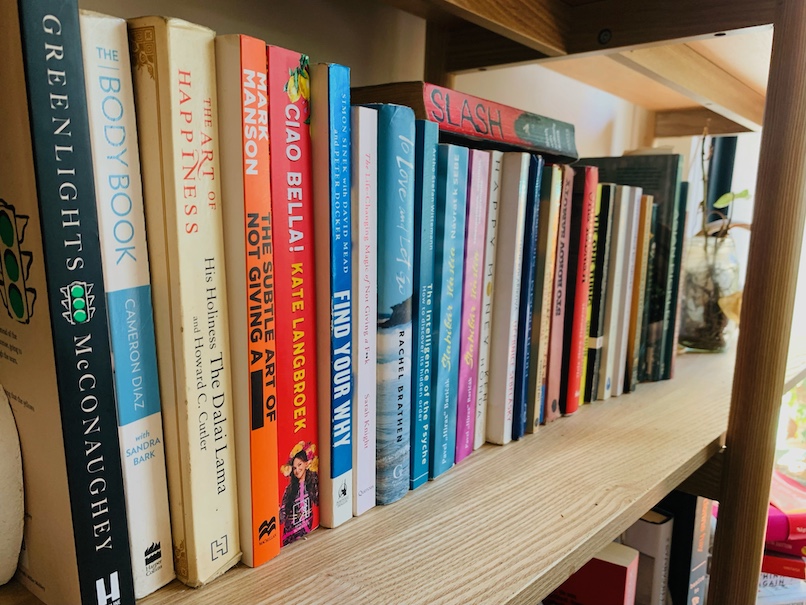Som veľký nadšenec pre ciele a ak nejaký nemám, neviem čo so sebou. A teda ich mám viac. Za roky na tomto svete som skúsila mnoho prístupov:
- stanoviť si cieľ a robiť na ňom hlava-nehlava, bez rozmyslu
- stanoviť si cieľ a prepracovať ho totálne do detailu
- stanoviť si viac cieľov a nezačať robiť na ďalšom, kým prvý nie je hotový
- na všetko sa vykašľať a ísť na pivo

Aby som vám ušetrila čas – ani jedna z vyššie uvedených stratégií nefugnovala. Pri tej prvej – nuž, človek robí a robí a príde na to, že si mohol ušetriť kopec času a peňazí ak by sa na začiatku zastavil a porozmýšľal. Work SMART not HARD.
Druhý extrém? Všetko naplánovať do detailu? Poznáte to, na minútu si naplánujete itinerár dovolenky a čert to vezmi – hneď prvý deň prší! A je po pláne.
Ak máme viac cieľov, najmä v tých dlhodobých môžu nastať prestoje. Môžem odovzdať zadanie, ale ak mi zo školy tri týždne nepošlú súhlas, že postupujem ďalej, neznamená to, že musím byť nečinná. Môžem pracovať na niečom inom.
Ten štvrtý spôsob prichádza na rad, ak je toho priveľa, ak sa zahltím, prepracujem, či stratím v detailoch. Alebo neviem cieľ správne rozporcovať a neviem kde začať.
V rácmi kurzu koučingu bolo jedným zo zadaní urobiť kritiku knihy „Koučovanie s NLP“ od J. O’Connor & A. Lages a ich postup sa mi páčil. Dokonca tak, že som si povedala, že ho budem aplikovať na vlastné ciele. Práve v tomto článku som jeden zo svojich cieľov rozporcovala podľa ich otázok.
Pre koho je článok?
Pre ľudí ktorí:
- si dávajú ciele a chcú zdokonaliť svoj proces, napríklad im chýbajú výsledky alebo by ich chceli zlepšiť
- nemajú skúsenosti s dávaním si cieľov, chcú začať, ale nevedia ako na to
Tí z vás, ktorí si idete čistý flow a nechávate váš osud na vesmíre, rodičoch a frajerke, vás to asi baviť nebude.
Ideme na to.

1. Vyjadrite svoje ciele v pozitívnom jazyku
Mám pocit že tento bod by som mohla preskočiť – lebo však to počul a vie každý. Minule som však niekomu povedala, že si robím kurz koučingu (a o koučingu v mojej hlave počul každý) a dostala som otázku – “Čo je to?”. A bolo to tu v Austrálii, kde je táto služba rozšírenejšia ako na Slovensku.
Takže, tí z vás ktorí ste už o cieľoch čítali, to pravdepdobne viete. Tí, ktorí sa o dávaní si cieľov ešte len učíte, nech sa páči.
Napríklad, poviem vám aby ste si nepredstavili ružového slona. Predpokladám, že ste teraz pred sebou videli ružového slona. Myseľ akoby nevedela reagovať na príponu “ne” nazačiatku. Bez ohľadu na zápor si vybaví o čom je reč.
Keď premýšlame o tom, ako zlepšiť svoj život, často krát (najmä ak sme v dávaní si cieľov začiatočníci), prichádzame s vecami, ktoré nechceme:
- Do pol roka nebyť v súčasnej práci
- Nežiť z výplaty do výplaty
- Nebyť tučný
To isté platí pre predsavzatia
- Nejesť sladkosti
- Neprejedať sa
- Neohovárať
Čomu venujem energiu, to rastie
Pointa dávania si cieľov je váš fokus. A ak si stanovíte za cieľ “nežiť od výplaty do výplaty”, váš fokus je nasmerovaný, nuž, na život od výplaty do výplaty.
Nejdem tu teraz rozprávať o kvantovej fyzike, zákone príťažlivosti či filmoch ako Secret. Hovorím o neurovede – myseľ sa vie naraz sústrediť len na jednu vec a na čo sa sústredíš, tomu venuješ čas a energiu. Bez ohľadu na zápor (príklad s ružovým slonom).
Napríklad, ak je naším cieľom prestať jesť sladkosti a nezdravé jedlo, jediné čo docielime je, že neustále myslíme na sladkosti a nezdravé jedlo. A preto je lepšie sústrediť sa na to, čo chceme jesť, na to, aké zdravé potraviny do seba vieme dostať a čo nám to prinesie.
Ak sa chceme v niečom zlepšiť, nepomôže nám odstraňovať svoje zlé vlastnosti a slabosti – týmto štýlom sa na ne budeme ešte viac sústrediť. Naopak, sústreďme sa na to, čo chceme zlepšiť. To isté platí ak premýšľame o iných ľuďoch. Čím viac sa sústredíme na ich chyby, tým frustrovanejší a otrávenejší budeme.
Ako sa dajú tie isté ciele vyjadriť inak inak?
Do pol roka nebyť už v súčasnej práci. Do pol roka si nájsť si prácu ktorá ma napĺňa. / Začať podnikať.Nežiť z výplaty do výplatyVytvoriť si na účte rezervu XY eur. / Nájsť si prácu s lepším príjmom aspoň o XY eur. / Zlepšiť svoj cashflow.Nebyť tučnýZlepšiť svoju fyzickú kondíciu. / Vybudovať si svalstvo. / Vyformovať postavu.
To isté platí pre predsavzatia
Nejesť sladkostiNájsť drobné snacky, ktoré uspokoja moju chuť niečo chrúmať.Neprejedať saNájsť spôsob ako jesť akurát. / Skúsiť čiastočné hladovanie aby som vykompenzoval/a nárazovité jedenie. / Dávať si do porcií väčší pomer zeleniny.NeohováraťSústrediť sa na veci, ktoré sa ma týkajú a viem ovplyvniť. / Zastať sa neprítomných.
Dodržiavanie už len tohoto princípu vám zvýši šance, že dosiahnete to, čo chcete.
Otázky ktoré si položiť:
“Čo chcem?”
“Čo chcem miesto toho (čo mám)?”
Aplikácia na môj súčasný cieľ:
Chcem mať svoju webstráku nie len v Slovenčine, ale aj v Angličtine.

2. Urobte svoj cieľ špecifickým
Pri niektorých cieľoch je toto ľahšie. Ciele ako nový mobil, exotická dovolenka, či nový dom vám dávájú možnosť snívať o detailoch. Môžete hovoriť o modeloch, výzore destinácie a architektúre a dizajne domu.
Pri abstraktných cieľoch je to ťažšie – je ťažké presne odmerať to, či sa zlepšil vás partnerský vzťah, alebo sebavedomie. V tomto prípade si môžete stanoviť, čo bude pre vás dôkazom, že sa vaše ciele naplnili. V prípade sebavedomia si napríklad poviete, že budete schopný povedať prípitok pred viac ako desiatimi ľuďmi.
Čím dlhodobejší cieľ, spravidla je tým ťažšie je byť špecifickým, čím krátkodobejší cieľ, tým je to jednoduchšie.
Otázky, ktoré si položiť:
“Čo presne chcem?”
“Kedy to chcem dosiahnuť?”
“Koľko času treba na dosiahnutie?”
Aplikácia na môj súčasný cieľ:
Do Angličtiny bude preložené všetko, okrem blogu.
Chcem to uskutočniť do konca Marca 2023.
3. Rozhodnite sa, ako dostanete spätnú väzbu o napredovaní
Ktorý typ cieľa si stanovujete?
Pre výsledkové ciele je treba mať nastavený dôkaz o tom, že sme cieľ splnili. Napríklad “do júla budem o 10 kg ľahší / ľahšia” namiesto “do Júla schudnem.”
Pre procesné ciele je dôležité stanoviť si spätnú väzbu. Napríklad “každý deň spravím 10 000 krokov” namiesto “každý deň sa budem viac hýbať”.
Spätná väzba je dôležitá pre oba typy cieľov – ak lietadlo letí zo Singapúru do Viedne a pilot nastaví smer, neprestane sa po ceste pozerať na GPS. Okrem toho, že náš proces nemusí fungovať, či nemusí byť postačujúci, prichádzajú rôzne udalosti, ktoré nám môžu cestu narušiť.
Otázky, ktoré si položiť:
“Ako budem vedieť, že som dosiahol / dosiahla svoj cieľ?”
“Aké míľniky si nastavím po ceste?”
“Ako budem vedieť, že postupujem v súlade s plánom?”
“Ako často budem kontrolovať, že idem v súlade s plánom?”
Aplikácia na môj súčasný cieľ:
V Apríli bude na mojej stránke preložené všetko okrem blogu.
Míľniky:
- Výskum ohľadne plug-inov ktoré umožňujú preklad stránok a jeho inštalácia
- 6 stránok na preloženie = 6 míľnikov
To sa rovná sedem krokov.
Ak každý týždeň urobím jeden krok so začiatom budúci týždeň, mala by som skončiť začiatkom marca. Ak prirátam rezervu na komplikácie a čas venovaný kurzu koučingu, malo by to byť stále zvládnuteľné.
Koncom Januára bude preložená aspoň jedna stránka a koncom Februára väčšina.

4. Dajte si dokopy zdroje
Na to, aby sme dosiahli svoj cieľ potrebujeme určité zdroje, ako napríklad:
Veci – knihy ktoré sme prečítali alebo nám môžu dať potrebné informácie, náradie a technológiu (od počítačov cez smoothie mejkre až po vŕtačky), audioknihy, videá, podcasty
Ľudia – naša rodina, partner, priatelia, ktorí nám môžu poskytnúť podporu, naše kontakty, skvelý mentor či kouč
Čas – máte dostatok času venovať sa svojmu cieľu? Ak nie, ako si ho vytvoríte? Čo budete robiť ak nastanú dlhé prestoje?
Vzory – poznáte niekoho, kto dosiahol čo chcete? Ako to urobili?
Osobné kvality – aké kvality treba na to aby ste dosiahli svoj cieľ? Už ich máte, alebo si ich musíte osvojiť?
Otázky, ktoré si položiť:
“Aké zdroje budem potrebovať na dosiahnutie môjho cieľa?”
“Ktoré zdroje už teraz mám?”
“Kde nájdem zdroje, ktoré budem potrebovať?”
Aplikácia na môj súčasný cieľ:
Počítač – mám
Internet – mám
Čas 1.5 – 3 hodiny týždenne – rána pred prácou ak ich nebudem potrebovať pre kurz, môžem využiť jeden večer v týždni kedy je priateľ v práci, alebo soboty rána ak si privstanem
Trpezlivosť s technológiou – nemám, prežijem to
5. Buďte proaktívni
Toto sa týka cesty k vášmu cieľu.
Už len samotné stanovenie si cieľa je znakom proaktivity. Totiž, ak si ciele nestanovíme my, stanoví nám ich niekto iný. Príklad – ak máme program a zavolajú nás nečakane do práce, lebo im niekto vypadol, je veľmi ľahké povedať nie. Možno dokonca ani len nie sme v meste. Ak však sedíme doma na gauči, je oveľa ťažšie odmietnuť. Bez vlastného programu dávame priestor agende niekoho iného.
Stanoviť si cieľ je však len začiatok. Prevziať kompletnú zodpovednosť za veci, ktoré sa stanú a nestanú je ďalší level. Počúvajte ako rozprávate. Používate aktívny či pasívny jazyk?
Prezentácia išla výborne. vs. Odprezentoval/a som to výborne.
Pokašľalo sa to. vs. Nezvládol / nezvládla som to. Dostatočne som sa nepripravil/a.
Skúsim. vs. Nájdem spôsob ako to urobiť.

Otázky, ktoré si položiť:
“Ako veľmi je tento cieľ v rámci mojej kontroly?”
“Čo budem robiť, ay som cieľ dosiahol/dosiahla?”
“Čo môžem ponúknuť ostatným, aby mi chceli pomôcť?”
Aplikácia na môj súčasný cieľ:
Naplnenie tohoto cieľa mám plne pod kontrolou v prípade, že existuje plug-in, ktorý mi to umožní (plán A). V prípade, že takýto plug-in neexistuje, budem musieť kontaktovať programátora (plán B), ktorý mi poradí čo ďalej a vtedy do určitej miery strácam kontrolu nad tým, ako dlho bude dosiahnutie cieľa trvať.
Plán A – naučím sa ako prekladať stránky v plug-ine a týždenne sa tomu venovať.
Plán B – vysvetlím čo potrebujem a ponúknem peniaze.
6. Upriamte pozornosť na širšie dôsledky
Nesústreďte sa len na seba. Všetko čo robíme má širšie dôsledky, či už pozitívne, alebo negatívne.
Ak začneme cvičiť, budeme mať viac energie pre našu prácu a milovaných. No budeme si musieť privstať, alebo sa prinútiť cvičiť po práci.
Ak si za cieľ stanovíme vybudovanie vlastného podnikania, tiež to ovplyvní ľudí okolo nás. Možno budeme mať menej voľného času, minimálne na začiatku. Možno budeme musieť minúť úspory určené na rodinnú dovolenku. Tým nechcem nikoho odradiť od dávania si cieľov, hovorím o tom, že ku každému cieľu musíme pristupovať s otvorenými očami.
Ak si za cieľ stanovíme našetriť určitú sumu a rozhodnúť sa míňať len na absolútne nevyhutnosti, znamená to, že už nikdy nebudem môcť zobrať kamarátke kávu či víno? Je to reálne? Kto sa zo mňa stane na ceste k cieľu? Stojí to za to?
Pred niekoľkými mesiacmi som niekde zazrela citát od Tonyho Robbinsa, ktorý hovoril toto:
“Nie je to o cieli. Je to o raste stať sa osobou, ktorá ten cieľ dokáže dosiahnuť.”
Naozaj ma to trafilo.
Ako často sa sústredíme na výsledok, na to „čo bude ak tam už budem“?
Premýšame o tom, čo budeme robiť, ak bude hotovo?
Napríklad chceme mať vlastný biznis – nie je to však tom, že jedného dňa si povieme, že „biznis je vybudovaný“ a začneme chodiť na dovolenky kedy sa nám za chce. Je to o tom, že sa rozvíjame, učíme podnikať, osvojujeme si rozličné stránky budovania podnikania a v tom je tá radosť. Že sa obzrieme späť a vidíme, koľko sme sa toho za posledné mesiace a roky naučili.
Otázky, ktoré si položiť:
“Aké dôsledky bude mať dosiahnutie môjho cieľa na ostatných ľudí?”
“Koľko to bude stáť času, peňazí a príležitostí?”
“Čoho sa budem musieť vzdať?”
“Ako to ovplyvní balans rozličných oblastí môjho života – vzťahy, voľný čas, práca, zdravie – ak tento cieľ dosiahnem?“
“Čo je pre mňa aktuálne dôležité, čo budem musieť nechať za mnou?”
Aplikácia na môj súčašný cieľ:
Po dosiahnutí tohoto cieľa budú môcť Austrálčania navštíviť moju stránku a budú jej rozumieť. To mi uľahčí proces budovania klientely.
Plán A nestojí peniaze, len čas. Nestojí ma žiadne príležitosti, naopak, buduje ich do budúcna. Tiež mi to dá viac slobody, tým že si budem tvoriť aj austrálsku klientelu.
Čo sa týka balansu, budem musieť balansovať medzi kurzom, ale tam momentálne pracujem skôr po večeroch a budem po víkendoch.
7. Pripravte si akčný plán
Toto je to, čo premieňa sen na cieľ. Keď zadefinujete kroky k svojmu cieľu, je to akoby ste dali svojmu snu nohy.
K tomu, aby ste na cieli začali pracovať, potrebujete motiváciu. A preto váš cieľ musí byť tak správne náročný – musí to byť výzva, ale zároveň musí byť realistický.
Priveľký cieľ vás odradí, nebudete mať dostatok sebavedomia. A teda motivácie.
Primalý cieľ vás bude nudiť, budete vedieť, že jeho naplnením sa toho veľa nezmení, alebo si budete hovoriť, že je tak ľahký, že na ňom môžete začať robiť kedyľkovek.
Dlhodobý cieľ môže na váš pôsobiť skľučujúco – a práve preto potrebujete akčný plán. Akčný plán vám rozdelí cieľ na menšie, zvládnuteľné kroky. Alebo ako to hovorí Stáňa Stiborová – treba vedieť ako rozporcovať slona na malé stráviteľné kúsky.
Aplikácia na môj súčašný cieľ:
Mojím akčným plánom sú všetky kroky vymenované v ostatných bodoch. Idem si spraviť kávu, postnem tento článok a môžem začať.

Update 29.01.2023 – cieľ splnený, až na nejaké problémy s kontaktnými formulármi.






